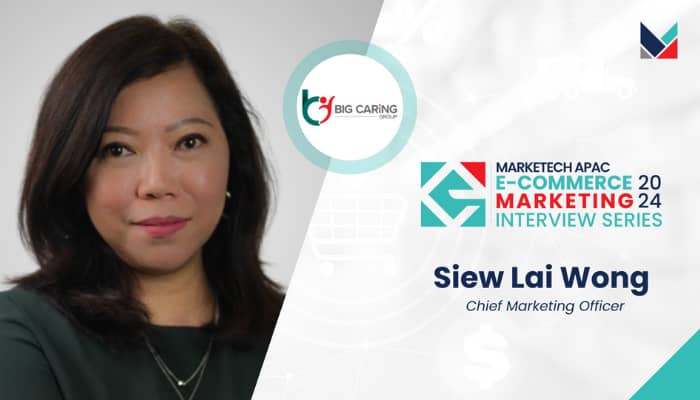E-commerce marketing techniques are now crucial for retail brands looking to improve the customer journey in the current digital era. One cannot stress how crucial it is to provide a smooth, interesting, and customised experience as more and more customers choose to purchase on internet platforms.
In addition to drawing in new clients, efficient e-commerce marketing helps existing ones at every step of the buying process—from awareness to completion and beyond. Retail businesses can create sustained growth in a highly competitive market by fostering stronger connections with their audience, improving customer satisfaction, and utilising innovative digital tools such as data-driven insights and targeted advertising.
For our latest interview as part of our E-Commerce Marketing Series, we recently spoke with Siew Lai Wong, chief marketing officer at BIG CARiNG Group to better understand how e-commerce marketing strategies play out for a retail brand under the pharmaceutical industry, and what can marketers do to strike a balance between using technology and understanding human behaviour to serve the best campaign to them.
From generic to hyper-personalisation strategies
One of the things that Siew Lai pointed out as one of the key trends amongst brands in terms of e-commerce marketing strategies is how they have evolved from seemingly targeting a general audience to catering to the specific needs of customers who return to the brands for a new transaction.
“Firstly, I am seeing a shift from generic promotions to hyper-personalisation experiences based on individual health profiles, purchase history, and browsing behaviour. This utilises AI-driven recommendations and dynamic content to create a more relevant shopping experience,” she said.
Siew Lai added, “Secondly, customers expect seamless transitions between online and offline channels. Customers expect a seamless experience whether they shop in-store, online, or through marketplaces.”
It is also worth noting as well that seamless experiences with customers allows brands to give customers easier access to their services–and in their case being able to offer healthcare consultations and other medical-related advice.
“The integration of telehealth services with e-commerce platforms is creating seamless customer experiences, allowing for easier access to health care professional consultations to advise on personalised healthcare. In the Big Pharmacy App, we have tele-consultation backed by certified HCP, which integrates tele-consultation, e-pharmacy and e-commerce seamlessly,” she explained.
Expansion of AI and omnichannel to improve marketing opportunities
For Siew Lai, one of the most promising opportunities in e-commerce marketing is the expansion of omnichannel strategies, as well as how AI is set to revolutionise e-commerce marketing by enabling hyper-targeting and personalisation.
“Customers expect a seamless experience whether they shop in-store, online, or through a marketplace. Additionally, leveraging AI and machine learning to optimise marketing efforts and improve customer insights presents a significant opportunity,” she said.
She added, “Predictive analytics will help forecast demand and optimise inventory, while chatbots and virtual assistants will enhance customer service. Moreover, AI-driven content creation and automation will improve marketing efficiency.”
It is worth noting, however, that there are also challenges in the implementation of these new types of technologies for e-commerce marketing strategies.
“Challenges include navigating regulatory landscapes, as different countries within SEA have varying regulations regarding online pharmacy retail. Another challenge is building and maintaining customer trust in a space where product authenticity and safety are paramount. Lastly, the competition from both local and international players is intense, requiring continuous innovation and differentiation,” she explained.
To solve this, she stated that at BIG Caring Group, they are investing heavily in these technologies, focusing on upskilling their workforce to leverage tech tools effectively. Additionally, she also stated that the company is continuously enhancing their data analytics capabilities to gain deeper customer insights and improve decision-making.
Requiring a customer-first mindset approach
When asked about the balance between human intervention and technology implement, Siew Lai said that investing in AI and automation can free up human resources to focus on more strategic, creative, and relationship-building activities. However, there is also greater need to have the ‘human touch’.
“Striking a balance between efficiency and human centricity requires a customer-first approach. Companies should leverage technology to streamline processes and gain efficiencies, but not at the expense of the customer experience. This means maintaining a human touch where it matters most, such as in customer service and personalized interactions,” she explained.
Additionally, she also said that gathering and acting on customer feedback can help ensure that the technology implementations are enhancing rather than detracting from the customer experience.
In her particular industry, she explains that the e-commerce landscape in the retail pharmacy scene is likely to see significant growth and transformation. For her, they anticipate a greater integration of digital health services, such as tele-consultation, e-pharmacy, with e-commerce platforms.
“BIG Caring Group aims to be at the forefront of this transformation by continuously innovating and adapting to changing market dynamics. We are committed to enhancing our omni-channel presence, expanding our digital health services, and leveraging cutting-edge technologies to improve customer satisfaction and operational efficiency. Our goal is to set new standards in the healthcare ecosystem that allows continuous monitoring of health and well-being, centre around patients self-care,” she concluded.
By focusing on personalised experiences, data-driven insights, and targeted engagement, these strategies transform the online shopping process into a more intuitive and satisfying experience for consumers. This not only increases customer retention and loyalty but also drives higher conversion rates and revenue growth.
As the digital marketplace continues to evolve, retail brands like those in the consumer pharmaceutical scene that prioritise and innovate in their e-commerce marketing efforts will be better positioned to meet the ever-changing demands of their customers, ensuring sustained success and a competitive edge in the industry.
MARKETECH APAC is leading the conversation on the future of e-commerce marketing strategies this 2024 and beyond with the E-Commerce Marketing in the Philippines 2024 conference on August 14, 2024 at Crowne Plaza Manila Galleria. Join us and become an integral part of a dynamic community committed to pushing the boundaries of innovation and fostering unparalleled growth in the e-commerce domain.





